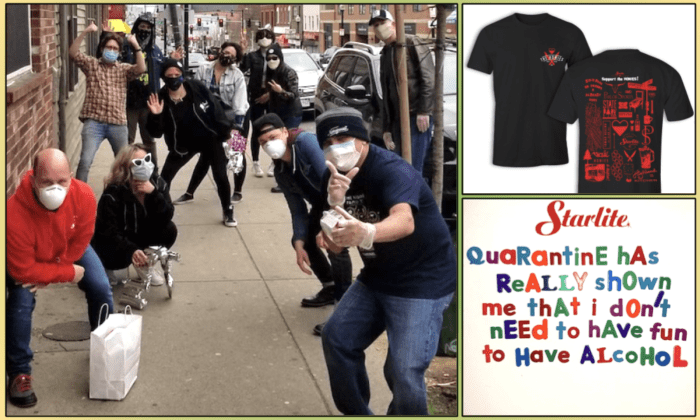
New restaurant initiatives sweeten deals for donors to help “people who aren’t getting help from government sponsored programs.”
If there was ever a time to need a stiff drink—or three—that time is probably now. With millions of people out of work, schools closed for the remainder of the academic year, and businesses across the city shuttered until … well, we don’t exactly know when, the desire to pull up a bar stool and knock a few back is strong.
Which makes it doubly painful that bars and restaurants are closed; while in times of crisis many of us want to chemically take the edge off, the desire to congregate, to gather, to connect with others, to be seen and heard, is even stronger.
And nobody knows that better than the people who work in our local watering holes and dining establishments.
The crisis of COVID-19 is manifold for Boston and Camberville chefs, cooks, servers, bartenders, and restaurant owners because not only are we out of a job, and a paycheck, and/or are hemorrhaging money to cover rent with very little business sales, we’re also struggling to find ways to keep a core part of our identity alive. We’re in the business of taking care of people, and since giving a friend or a regular or a stranger who looks like they’re having a bad day a hug is a major breach of CDC health regulations, thousands of us are sitting at home thinking, Oh, fuck. What now?
As a community, as an industry, we’ve never been a group to dwell on that question for too long. We throw a party every night of the week, sometimes against all odds. Oh, that delivery didn’t come in? Our barback called out? Someone threw up all over a table in the middle of the dining room? It’s cool, guys, we got this.
Boston’s hospitality industry has long been the source of creative campaigning, from fundraising for abortion access in Alabama, to launching a space for local artists to showcase their work, to rotating guest shifts of the city’s many talented female bartenders, and now much of that energy has been directed towards aiding the thousands of out-of-work cooks, bartenders, and servers on both sides of the river.
There is no “upside” to our current homebound, quarantined, and socially distanced situation, but there are patches of light out there cutting through the darkness. Silver linings, if you will. On the strength of that hope, here is the first installment of a series recognizing the people working to mitigate pain throughout the industry during the pandemic, and striving to ensure that when Mass safely reopens for business our favorite places—and the people who work in them—come back, too.
Turning Restaurant Workers into Art Dealers
Following a successful initial push for donations to support staffers, in the past two weeks, Trina’s Starlite Lounge and sister-bar Parlor Sports have launched two initiatives to support their staff who may not be eligible for government benefits.
“In our community, that is our biggest concern right now,” Emma Hollander, managing partner at both locations, said about the campaigns. “Our entire front-of-house (servers and bartenders) is already on unemployment, but the people that can’t get unemployment are just fucked.”
“Where we’re at at this point is we need to make sure that the people that can’t get unemployment benefits are surviving,” Emma added. “Our entire Venmo account is going to those people.”
The Starlite crew is getting creative in its approach.
“We’re calling the first [initiative] Turning Restaurant Workers Into Art Dealers, because that’s honestly the best way to capture it.”
For this project, Emma partnered with her sister, mixed-media artist Tanja Hollander, for a two birds, one-stone style collaboration.
“Just as much as bars and restaurants are struggling, artists are also obviously super struggling and not eligible for unemployment or any of that,” Emma said. “Art is one of those things you don’t buy when you don’t have disposable income.”
“We decided that if we sell her art, she’ll give us 50% of the sales.”
It really is a win-win for everyone involved: by mentioning a local restaurant at checkout on Tanja’s website—a handful of local spots are promoting this collaboration—half of the sale amount goes to the restaurant’s Venmo account.
“It’s a great way for people to get something out of donating to staff,” Emma said. “You’re helping her survive, helping us survive, and you get a beautiful piece of work from it.”
Opening a Venmo account to take donations for out-of-work staff has been popular with many bars and restaurants in the area, but this partnership changes up the standard donation vibe. “I think that the Venmo campaigns everyone is doing are great, and that’s sort of what we have to do right now, but with this you get something really special out of Venmo-ing our staff,” Emma said.
Support The Homies
For the second branch of the campaign, Trina’s and Parlor Sports partnered with local bartender and graphic designer Ryan Merry, as well as the online T-shirt printing company Real Thread to launch Support The Homies Campaign.
“Right now, people want to know if their bars have swag or merch they can buy, and for the places that don’t, ordering 2,000 shirts right now is completely out of the question, nobody can spend any money on anything,” Emma said.
Real Thread fixes the age-old adage of you gotta spend money to make money by sourcing and printing the shirts and by managing the campaign website.
“This has been great for us because you can order directly through the website and they print and ship them themselves, so you eliminate the middleman,” Emma said.
The Trina’s and Parlor Sports crew have joined Cambridge and Somerville establishments Vinal Bakery, Viale, Highland Kitchen, and State Park for a T-shirt campaign. Each shirt sells for $25 and features each spot’s logo as well as images that connect the six-establishment cohort, like a Miller High Life tallboy and an aerial view of Inman Square.
“All of that money is getting distributed amongst our employees who may not be eligible for government assistance across all six restaurants,” Emma said. “That’s a huge concern in our business and in our industry right now—how do we help people who aren’t getting help from government sponsored programs?”
Each Real Thread campaign runs for a maximum of 14 days, and this first push of Support The Homies ends Tuesday, April 28. Moving forward, Emma hinted that a second campaign (possibly hoodies) is likely. “We’ve sold 688 shirts, which is just incredible,” she said. “This is a no-brainer for us, anything we can do to get money for our staff.”
The general idea behind it all: without the people working in the kitchens, or washing dishes, or running food, none of the places we love to eat and drink can survive.
“I’m not sure the general public really understands how detrimental this is to our business,” Emma said. “We’re not opening for service any time soon. We need to figure out the best way to make some money and make sure we’re taking care of the people that really are the backbone of this industry. Bartenders are always going to be fine, we’re going to figure it out, but these folks get the least amount of credit and really are the unsung heroes.”
Still, there is one piece of the puzzle that nobody seems to have figured out:
“What we do for a living is so much more than shaking drinks,” Emma said. “A monkey can make a drink. Now we have to start figuring out how we can adjust what we do on the normal into our new normal. This is our community. People keep telling us how much they miss us and maybe some actually miss hot dogs, or the drinks, I don’t know, but it really is more than that. What we’re trying to figure out now is … how do we put hospitality in a to-go bag?”
I’m not sure we can figure out how to put hospitality in a to-go bag, but a T-shirt from Support The Homies or one of Tanja Hollander’s photos can help until we figure the rest out.
To donate to the staff at Trina’s and Parlor Sports you can Venmo @TrinaStarlite-ParlorSports.
This article was produced in collaboration with the Boston Institute for Nonprofit Journalism as part of its Pandemic Democracy Project.
HELP DIGBOSTON WEATHER THIS STORM AND CONTINUE PROVIDING ARTICLES LIKE THIS ONE
Haley is an AAN Award-winning columnist for DigBoston and Mel magazine and has contributed to publications including the Boston Globe and helped found Homicide Watch Boston. She has spearheaded and led several Boston Institute for Nonprofit Journalism investigations including a landmark multipart series about the racialized history of liquor licensing in Massachusetts, and for three years wrote the column Terms of Service about restaurant industry issues from the perspective of workers.

